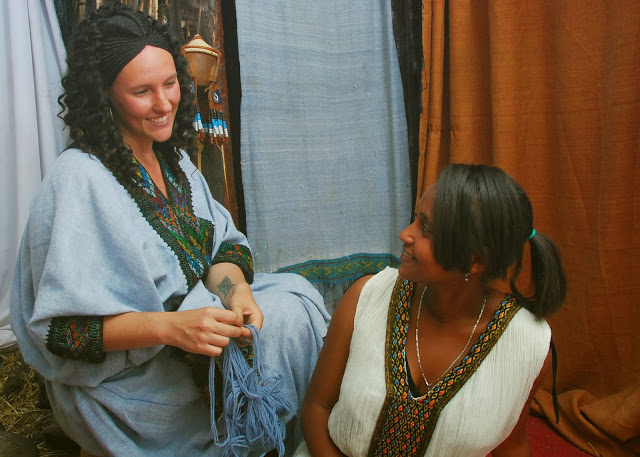Birth Control in Ethiopia: In Conversation with Lizzie Pelz

Looking for birth control in Ethiopia? We had the pleasure of speaking with Lizzie Pelz and Lizzie shares what she’s learned during her 27 months in Ethiopia.
Birth Control in Ethiopia: In Conversation with Lizzie Pelz
Tell us about yourself! What do you do when you’re not traveling the world? What made you decide to go to Ethiopia?
My name is Lizzie and I am a recent Returned Peace Corps Volunteer. I’m a native Texan, coffee connoisseur and I can handle my spices. After working in Community Health and HIV in Ethiopia for two years, I have just been accepted into the online MPH program at George Washington University, through which I will pursue a Global Health concentration. Right now I am looking to see where opportunity will take me.
How long were you based in Ethiopia? How did you spend your time there?
I was in Ethiopia for a total of 27 months, three months of training and then two years at my site in Maychew, Tigray. My job for two years was basically talking about sex. Not in the salacious sense, well not always, but I focused on HIV prevention, family planning, safe sex education, and Preventing Mother-to-Child Transmission (PMTCT).
I facilitated weekly anti-AIDS club meetings at two local schools, I obtained a PEPFAR (President’s Emergency Preparation for AIDS Relief) grant to fund a redesigned PMTCT program at one of the health centers, and I trained health staff in Project Design Management.
I also coordinated Tigray Trek242, a collaborative project in which 20 Peace Corps Volunteers ran 242 km through the Tigray province and raised awareness about HIV/AIDS issues in eight different towns on route. Each day, typical or not, involved me drinking traditional Ethiopian jebena coffee and conversing with people in Tigrigna.
Tell us about your experiences getting birth control in Ethiopia. Where did you purchase it? Was there anything you needed to do before purchasing it? How much did it cost?
I purchased birth control for both personal and professional purposes. I was a well-known customer at a few pharmacies in town and staff at the health center would give me free contraceptives every now and then for demonstration purposes. Even before I became well-spoken in Tigrigna, communication was easy because all the birth control methods in Ethiopia are known by their English names and I had no restrictions placed on me in purchasing them.
At the pharmacies I was able to get male condoms, female condoms, the daily estrogen pills and daily progestin pills, and emergency contraceptives. A pack of three Sensation brand condoms costs two or three Ethiopian birr, $0.10 to $0.15 USD. A three months’ supply of pills usually run 20 to 30 birr, $0.98 to $1.47 USD.
I never paid more than 15 birr, $0.73 USD, for emergency contraceptives. I was even able to get some birth control for free or at a discount because I was such a frequent customer and one pharmacist in particular was supportive in my educational efforts.
From the health centers I was able to get the whole spectrum. This included: condoms, estrogen pills, progestin pills, DEPO injection, the implant (Implanon/ Nexplanon), and the intrauterine device (IUD).
From the health centers I was able to get the whole spectrum. This included: condoms, estrogen pills, progestin pills, DEPO injection, the implant (Implanon/ Nexplanon), and the intrauterine device (IUD). On days that I educated students or HIV positive mothers about contraceptives, I would have a table layout of all these methods.
The difference at the health center, though, from the pharmacies, is that all these methods are available for free. Ranging in effectiveness from one sexual encounter to five years, these forms of birth control are available to Ethiopian women at no cost through an initiative called Youth Friendly Services (YFS), currently available at over 160 sites in the country.
Since I was informally accepted as staff at the health center and the nurses knew I was using them for educational purposes, I had no trouble obtaining the contraceptives.
What was similar or different about purchasing birth control in Ethiopia compared to the experience in your home country? How widely is birth control used in Ethiopia? Are there some forms that are more popular than others?
Much, much easier. In terms of legality and costs. Birth control can cost anywhere from $30 to $600 in the United States if the woman is not insured and all require a doctor’s visit. Also, purchasing emergency contraception in the past required ID to show I was at least 18 years old and cost $60 USD.
In Ethiopia, I don’t need a doctor’s visit or prescription to purchase pills, though the pharmacists will give customers advice and instructions for correct use. If I did want to start using the DEPO, implant, or IUD, I would have to have an appointment with a Youth Friendly Services nurse to determine which method is best for me and then that nurse could administer the injection or implant. The IUD has to be implanted by a Maternal and Child Health nurse. Again, all of these methods are available for free through participating health centers.
That said, it does not mean that every Ethiopian woman has easy access to birth control. Many Ethiopians live in rural areas where they could be a whole day’s walk from the closest health center, or a full-scale health center that has YFS facilities. For those who live in towns or major cities with pharmacies, health centers with YFS, and hospitals, the physical access far surpasses what we often encounter in the United States.
On another note, religious, cultural and social pressures often deter Ethiopian women from utilizing these services, even if the facilities are just around the corner. I have met Ethiopian teenage girls who have undergone multiple abortions rather than use birth control.
Whether it be the daily pill or the five-year IUD, I appreciated the easy access to the methods I had in my town, but was often stunned by the frequency of unintended pregnancies and abortions.
Too often they are not in control of their sexual and reproductive health whether it be from parental pressures, spousal disapproval, or just the fear of someone in the community seeing them enter the facilities. Though the situation is slowly getting better, unintended pregnancy is still a major public health issue in Ethiopia, especially at my site, where we were recorded as having the highest occurrence of abortions in the entire Tigray province in 2012.
Interviewing the YFS nurses at my site and reviewing publications from both Adigrat and Mekelle Universities revealed that women who do use birth control far prefer the daily pill and the DEPO injection compared to the longer lasting/procedural methods like the implant and IUD.
This is usually due to the ease of administering pills and injections and the ease of quitting the birth control method while the implant and IUD require more invasive procedures for both insertion and removal. Also, rumors of injury to the body as results of using the implant or IUD are very common.
Birth Control in Ethiopia: A Conversation with Lizzie Pelz

Are there any foreign words/phrases that might help women purchase birth control?
The second national language of Ethiopia is English and all the birth control methods are known by their English names. Also, many pharmacists in Addis Ababa and the major cities speak English. If you want to try local phrases for bragging rights, you can say:
“Estrogen/ progestin pill ifeligallehu.” (Amharic)
“Estrogen/progestin pill ideli iye.” (Tigrigna)
Both mean “I want the estrogen/ progestin pill.”
Please share any other tips/recommendations for purchasing birth control in Ethiopia that you think might help the Pink Pangea community.
The tourist visa for Ethiopia is three months and estrogen or progestin-only pills are sold at three months’ supply at a time, so you may only need to make one purchase. If you are planning to stay for an extended period of time for work, then it is just a matter of making sure you purchase your next supply before you reach the end of your third month.
If you cannot handle the side effects of estrogen pills and/or if you’re a smoker, then the progestin pill (called I Plan) is a better option. Just know that you will have irregular bleeding for the first few months.
I recommend the longer lasting procedural methods of birth control only if you know for sure that you are staying for a matter of years and if you absolutely cannot use estrogen or progestin pills. It is a matter of how comfortable you are with staff at the local health center or hospital, but you can also access these methods of contraception through private clinics. Though the exclusive services at private clinics demand small fees, they tend to have better trained nurses that are supervised by doctors.
And because this is my job and my passion, my conscious demands that I remind everyone…The pill, DEPO, implant, and IUD prevent pregnancy and do not protect against Sexually Transmitted Infections, including HIV. Condoms are available all over the place in Ethiopia for free or for low prices. Use them with the methods available to you and have a safe and pleasurable journey in the Roof of Africa.
Birth Control in Ethiopia: A Conversation with Lizzie Pelz
Related Reading
- Integrating into an Ethiopian Community
- My Experience with Ethiopian Men
- A Tale of Two Ethiopian Villages
- My Experience with Ethiopian Men
- 5 Tips for Avoiding Harassment in Ethiopia
Have you traveled to Ethiopia? What were your impressions? Email us at editor@pinkpangea.com for information about sharing your experience and advice with the Pink Pangea community. We can’t wait to hear from you.
Birth Control in Ethiopia: A Conversation with Lizzie Pelz photography credits: Lizzie Pelz









